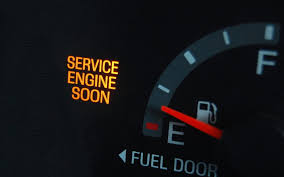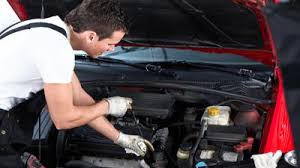How do you know if your car needs a new engine?
SIGNS AND SYMPTOMS OF ENGINE DAMAGE
The engine is the heart of your vehicle, giving your car the necessary power it needs to operate correctly. When the engine is damaged, it will significantly affect your car’s performance. Fortunately, you can save yourself time and money by quickly diagnosing engine problems before they cause more harm to your vehicle.
1. The Check Engine light turns on.
Dashboard warning lights are your car’s way of alerting you about problems it detects via its On-Board Diagnostics (OBD) system. If your Check Engine Light (CEL) turns on, you should not dismiss it, as ignoring the problem could cause more damage to your engine (and other parts) over time. There are many different things that can trigger a check engine warning light. Some common reasons for a check engine light appearing include:
- The Oxygen Sensor needs replacing.
- The Mass-Airflow Sensor is in need of replacement.
- The catalytic converter is damaged and in need of replacement.
- The spark plugs are damaged or worn (causing engine misfires).
- The fuel cap isn’t on tight enough (a very common, easy to fix issue).
- many other electronic sensor and actuator related issues
2. Your car is making strange noises.
A knocking noise coming from your bonnet is a classic sign of a dying engine. This noise could be caused by wear of damage to your engine’s mechanical parts such as pistons, bearings or other moving parts. If you hear this type of noise, you should take your car to a mechanic as soon as possible to prevent further damage. Ignoring this problem could result in your car breaking down on the side of the road and a much greater repair bill (than catching the problem early).
Other noises you should look out for include popping, spitting and backfiring from your exhaust.
3. The engine is running roughly or inconsistently.
Listen to the sound your engine produces while you are driving. Is it consistent? A struggling engine will often stutter, shake or lose power as the revs increase. A few common solutions for this may be to replace the spark plugs, test / replace your ignition coils, check your fuel pressure, clean your Air Flow Meter or give your engine a tune-up.
4. Your car produces oil patches.
If you notice puddles of oil under your vehicle, this is probably a result of a leak in your engine. As the oil depletes, more friction and will occur in your engine, generating excess heat. Oil leaks are common from engine oil seals, and sump plugs / sump plug washers. This can cause damage to engine components over time. We recommend that you get engine leaks sealed as soon as possible.
5. You can smell odours from inside the car.
The smell of a car’s emissions should never be noticeable from inside the vehicle. If you have a strong exhaust smell, of engine fumes or any other strange odours, this could be a sign of engine damage. Don’t ignore strange engine smells and expect them to go away. Get your vehicle checked so that the problem can be diagnosed.

Signs Your Engine Needs to be Replaced
Without proper care and maintenance, your car’s engine will deteriorate quickly. If you add a lot of miles to your car throughout the week, the engine will die even faster. All of that wear and tire will add up over time and bring the engine to a quick death. When the engine reaches this point, we may need to replace it with a new engine. A dying engine will often give you signs that it’s on its way out. Below are some of the most common symptoms.
1. Large Amounts of Exhaust Smoke
You know how frustrating it can be driving behind someone whose car’s tailpipe has a never-ending supply of smoke coming out. That smoke is a warning sign that the engine is headed toward failure. You can often tell what is wrong with the engine by the color of the smoke. For instance:
● Blue Smoke: The engine is burning oil.
● White Smoke: A cooling system is leaking.
● Black Smoke: The engine is burning too much fuel.
2. Knocking Noises
Although a noisy engine could signify a range of problems, knocking noises usually indicate that the engine bearings are worn out. When the bearings go out, it’s only a matter of time (and not much time) before the engine stops running entirely. If you bring your vehicle to AA Auto Technicians before the bearings go completely bad, you could save your car. We can replace the bearings and look at areas where you may need some further engine repair.
3. Metal Shavings Emerge During Oil Changes
The reason fluids exist in your engine is too keep a dry, hot metal part from scraping when it comes into contact with another dry, hot metal part. Without fluid, a running engine wouldn’t last more than a few hours. When the fluids are missing, grinding metal will create shavings that are scraped off during contact. Metal shavings are telling you that your car only has a few hours or days left to live if you don’t bring your car in so that we find the problem.
4. The Engine Has No Power
When an engine is failing to produce sufficient power, it could be the result of a combination of problems that are occurring at the same time. In essence, the engine is weak and needs significant repair to produce sufficient power. When the engine is that weak, we recommend that you give your car an engine replacement instead of repair. You’re likely to spend less money in the long run.

Ways To Tell If Your Car’s Engine Is Failing
Car’s engine – unsurprisingly – is the most important part of your car, and total engine failure can often mean a catastrophic cost of repair, or can even force you to “total” the car, and buy a new one.
Because of this, most engines are extremely durable, and can easily last hundreds of thousands of kilometers. Engines are usually one of the last components that will fail on a car, so you don’t usually have to be concerned about critical engine failure.
Still, critical engine failure does happen – but there are ways that you can mitigate the damage caused by a failing engine. If you catch engine failure early, you’ll be in a much better position to prevent further damage, and may be able to repair your engine easily, avoiding a costly engine rebuild or a totalling of your vehicle.
Read on to learn about most common signs of engine failure – and what you can do to prevent your engine from breaking down.
Car’s engine – unsurprisingly – is the most important part of your car, and total engine failure can often mean a catastrophic cost of repair, or can even force you to “total” the car, and buy a new one.
Because of this, most engines are extremely durable, and can easily last hundreds of thousands of kilometers. Engines are usually one of the last components that will fail on a car, so you don’t usually have to be concerned about critical engine failure.
Still, critical engine failure does happen – but there are ways that you can mitigate the damage caused by a failing engine. If you catch engine failure early, you’ll be in a much better position to prevent further damage, and may be able to repair your engine easily, avoiding a costly engine rebuild or a totalling of your vehicle.
Your “Check Engine” Light Is On
Despite what some people may tell you, this light doesn’t just come on for no reason. If your “check engine” light is on, you need to check your engine – or have it scoped out by a professional.
Now, your “check engine” light being lit doesn’t necessarily mean your car is in serious danger – it could be a problem as simple as a loose gas cap – but it should be taken into account when assessing the overall health of your car.
And if other lights such as low oil pressure, brake lights, and low oil level lights are on, you should be seriously concerned – and have your car looked at by a professional as soon as possible.
Jerking, Inconsistent Acceleration And Performance
A smoothly-running internal combustion engine delivers just that – smooth performance. You should be able to accelerate ably. Your car should not jerk around, surge forward, or stall when you apply the gas, and if it does, chances are that your engine is well on the way to failure.
Performance issues always signal a deeper problem, and in this case, that problem can be worn out spark plugs, clogged fuel lines, or even failing pistons. You should take your car in for a professional assessment if you are experiencing performance issues.
Poor performance also poses a driving risk – the last thing you want is for it to stall out on the left lane of the highway while running at 120KM/h. So don’t risk your life. If your car isn’t performing well, there’s a reason. If you ignore that reason, you risk a damaged engine and poor driving performance that could lead you into dangerous situations.
Hearing Noises That Shouldn’t Be There
A little bit of extraneous noise from your car is common, especially as it ages. But be on the lookout for noises that are out-of-place and sound dangerous. This can include loud clacking and popping noises, as well as grinding noises. Any unusual noise should be noted, and you should mention it to a mechanic.
Popping and clacking noises can indicate serious issues like premature detonation in your car’s engine block, which can destroy pistons and cause your engine to explode, in rare cases. Grinding noises when shifting gears could signal a damaged or worn-out transmission, and grinding noises upon startup could indicate a damaged starter motor.
So keep an ear out for strange noises. Though they could be as innocuous as a loose fan-belt, they could also signal that you’re on track for catastrophic engine failure. Mention these noises to your mechanic, so that they can check them out and ensure that your car is in good shape.
The Nose Knows – Identify Strange Smells
Cars often smell a bit funky – given the vast amount of complex fluids and emissions they produce – but you should be familiar with how your car smells in daily operation.
Smells like excessively hot oil, burning rubber, exhaust smells in or near the cabin, and so on are hints toward the health of your car.
These smells don’t happen without a reason. That reason could be a melting fuel hose, a damaged drive belt, or a complete failure of the exhaust system that’s causing a catastrophic engine meltdown.
If you start to smell strange scents, pay close attention to your dash and look for “check engine” lights. Check the heat level of your car, and make your way to a mechanic. Don’t risk continuing to drive a car that gives off strange scents – these are sure signs of component failure.